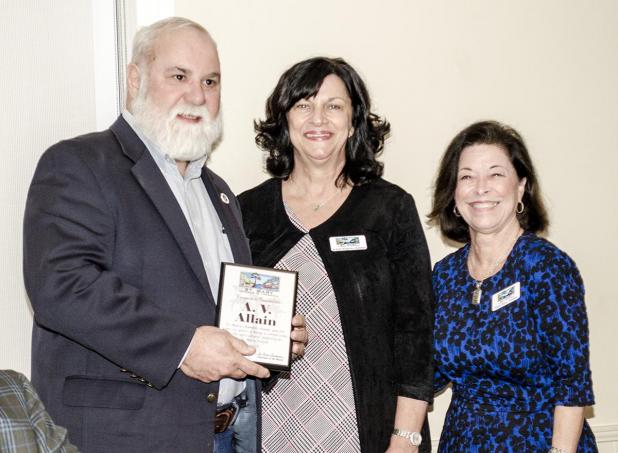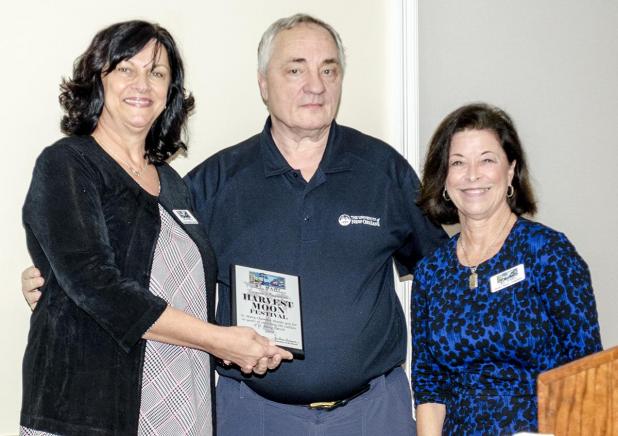
Louisiana State Senator Bret Allain accepts an honorary award Wednesday from St. Mary COC, on behalf of A.V. Allain, for years of community service to St. Mary Parish. The Banner-Tribune/CASEY COLLIER

Former Franklin City Main Street Manager Michael Domingue accepted an honorary award Wednesday on behalf of Harvest Moon Festival from St. Mary Chamber of Commerce’s Board Chairman Jo Anne Bergeron and COC President Donna Meyer.
Strain: 'We have to double world’s food supply'
Louisiana Department of Agriculture and Forestry Commissioner Mike Strain spoke Wednesday at a St. Mary Parish Chamber of Commerce luncheon at the Forest Restaurant in Franklin.
Strain followed two honorees being recognized by the COC for their contribution to parish communities: Harvest Moon Festival and A.V. Allain, accepted by former Franklin City Main Street Manager Michael Domingue and Senator Bret Allain respectively.
Strain opened by reminding luncheoners of the importance of agriculture as a foundation of the economy of any nation; and echoing his sentiments from last year’s COC address, he followed up by saying that the necessity of agricultural sustainability remains of the utmost importance, both nationally and internationally.
“We know that between now and 2050,” Strain said, “we have to double the world’s food supply.
“What that means is that we have to increase production three percent per year for 32 years in a row.
“In our best year, production has only increased 2.75 percent.
“We have to grow more food between now and 2050 than we have since the dawn of time.”
Strain said by 2030, America has to increase agricultural production by 50 percent because 20 percent of the food that is exported worldwide comes from the US, yet “we are five percent of the world’s population.”
Following his agricultural call to arms, Strain appreciated the conundrum on behalf of sugar cane farmers that growing more cane means planting more cane where space is at a premium already.
He posed that one thing farmers can do is reinvest in local infrastructure, and charged that the community as a whole has an obligation to shop locally instead of online.
He said there will be a dredging the Mississippi River to “50 feet all the way to Baton Rouge,” saying that more investment in infrastructure translates to more possible capital for local farmers which translates to more spending for more output for more food exported to put more money back into local pockets.
“The money that comes in from sugar, where does that money stay?” Strain asked rhetorically. “Right here,” was his answer.
He went on to cite the amount of uncirculated annual profits from sugar and agriculture production in St. Mary Parish as $100 million.
He then spoke about working closely with President Trump on making sure trade deals with other countries are fair and equitable for the American farmer, more so than they have been in the past.
According to Strain, American agriculture has been trading “peace for prosperity,” and has failed to leverage its power as the number one exporter of food in the world.
“It’s got to be fair,” Strain said, going on to point to the President’s recent tariff strategies with Canada and China as evidence of a shifting dichotomy in regards to fair trade.
Strain cited the imbalance in trade between America and China at $6 billion, explaining, “We buy $6 billion dollars more from them than they buy from us. That’s not fair.”
He posed that once international trade is made fair, America “will compete and out-compete everyone else.”
In addition to stabilizing the equity of trade agreements with China, Strain questioned the lack of diversity in the partners with whom the US trades, saying “Why have we been chasing China? Mexico is on board. Canada is on board and Japan is now going to open up for American products.” He added that the untapped potential for a trade partner in Cuba baffles him, saying that it also makes no sense to China, “the largest communist country in the world,” that we will trade with communist Russia but not communist Cuba.
To that end, Strain said he has drafted a letter to the President, in which he asked for trade with Cuba to be opened up.
As for the future of sustainability here in the US, Strain said we should look to agricultural technology. He said that by keeping up with and investing in agricultural technology, American farmers will be able to produce more and will see the benefits of such progress in terms of profits returned.
In harkening back to the dredging of the Mississippi River and investing in local infrastructure, Strain said that in Baton Rouge’s port, 50 percent of the grain exported from the United States gets unloaded.
He said, “We drop the banks another 50 feet, that’s another five feet per ship, we’re up to 75 percent of the exported grain from the United States coming through Louisiana.”
As for St. Mary Parish, Strain said that by his estimation, the dredging of the Mississippi River would translate to more rice being shipped out of St. Mary’s ports within the next four years, to add to our sugar exports.
“At every port up and down the Mississippi (River),” said Strain, “it is time to build. We are going to be getting a larger share of those naturally occurring exports. So, they’re getting ready.”
Strain closed with a message similar to his opening one, “We must protect our agricultural and natural resource based industries. They are the cornerstone of our economy. Everything else builds on them.”
